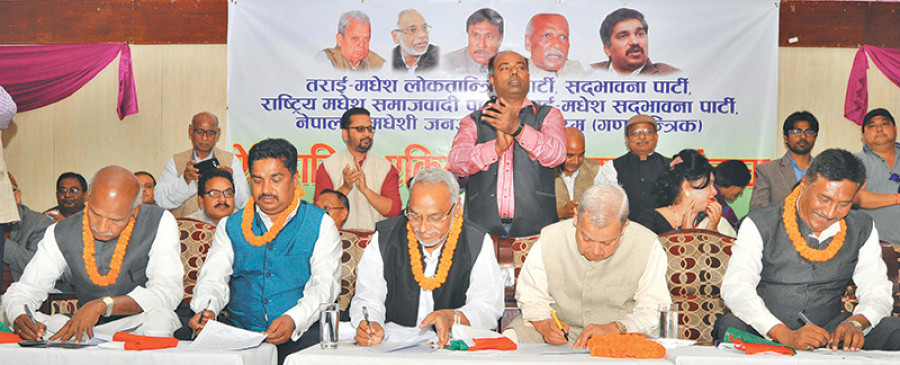Miscellaneous
RJP-N fallen between two stools?
On April 20, six Madhes-based parties that had formed an alliance under the Samyukta Loktantrik Madhesi Morcha decided to come under one umbrella to form a unified force—Rastriya Janata Party-Nepal (RJP-N).
Anil Giri
On April 20, six Madhes-based parties that had formed an alliance under the Samyukta Loktantrik Madhesi Morcha decided to come under one umbrella to form a unified force—Rastriya Janata Party-Nepal (RJP-N).
The move was aimed at creating “more pressure” on the government to address their demands like constitution amendment and revision of number and boundaries of local units in Tarai districts, among others.
Two days later, the governing parties and the agitating forces reached an agreement to hold local elections in two phases—on May 14 and June 14.
The deal had it that the government would address the agitating parties’ demands before the second phase of polls.
The first phase of polls was held as scheduled on May 14 in three provinces—3, 4 and 6.
While not much headway has been made as far as constitution amendment is concerned, the government on May 22 did decide to increase the number of local units in 12 Tarai districts. The decision stands stayed by the Supreme Court.
The government has also rescheduled the second phase of voting for June 28, which means elections in four provinces now are a little less than a month away.
But the Madhes-based parties under the RJP-N have been saying they will not participate in the elections until their demands are met. They have even announced protests.
Many believe the RJP-N’s planned protests are but a lost cause.
The six Madhes-based parties may have merged to form a unified force, it cannot be said they are “organically connected”, say political analysts.
A Madhesi leader, who did not want to be named, told the Post that there are differences within the RJP-N.
Some leaders within the RJP-N are for finding “a political way out” and going to polls and in the meantime continue the struggle to get the demands addressed, according to the leader. Others, however, say going to polls without the government addressing the party’s demands would mean losing face with the constituencies.
“We want to go to polls, but we need assurance from the government that it is going to address our demands,” said Sharat Singh Bhandari of the RJP-N. The Upendra Yadav-led Sanghiya Samajbadi Forum-Nepal (SSF-N) and Nepal Loktantrik Forum (NLF) led by Bijay Kumar Gachhadar are also a major cause for concern for the RJP-N.
The SSF-N participated in the first phase of elections and now it is planning an electoral alliance with the NLF.
This leaves the RJP-N with little choice, as it fears it could lose its constituencies to these parties, according to political analysts.
The RJP-N is on the horns of a dilemma.
“There is no doubt we are under tremendous pressure,” the Madhesi leader said, hinting that any face-saving political way out, which may not necessarily mean constitution amendment, could pave the way for RJP-N’s participation in the polls.
It is learnt that Mahantha Thakur, Rajendra Mahato and Raj Kishore Yadav are against participating in the polls in current circumstances. These are the key leaders of the RJP-N.
Yet another reason the RJP-N is hemming and hawing is, say analysts, its six constituent parties used to have their own constituencies and now with little preparations in hand, they are yet to zero in on the exact strategy.
The RJP-N appears to have fallen between two stools.
It fears backlash from constituencies if it decides to got to the polls without its demands addressed, the analysts say. “And if they refuse to participate in the polls, they run the risk of losing the constituencies to other parties like SSF-N and the NLF. Needless to say there will be other big parties in the fray.”
Madhesi leaders hold talks with Indian envoy
KATHMANDU: Rastriya Janata Party-Nepal (RJP-N) leaders including Mahantha Thakur, Sharat Singh Bhandari, Rajendra Mahato and Anil Jha on Tuesday held talks with Indian Ambassador Manjeev Singh Puri. The meeting comes amid the government decision to reschedule the second phase of local polls. Discussions were held on the government decision to delay polls, promises made by the governing parties and other matters, said Bhandari. It is learnt that the Indian ambassador insisted that the RJP-N should participate in the elections. Sources said Puri was of the view that the Madhesi leaders should seek to establish their agendas through the ballot. But officials at the Embassy of India denied that the ambassador had made such statements. An Indian diplomat told the Post that India as the largest democracy does not oppose elections. “Stability in the Tarai is our major concern. If election can ensure stability in the region, we very much welcome it,” he said. “But we did not prescribe any suggestions. The government is doing preparations to address their demands.” (PR)




 9.7°C Kathmandu
9.7°C Kathmandu










